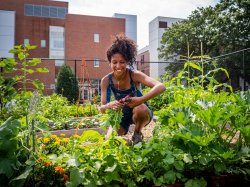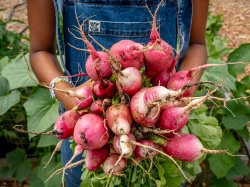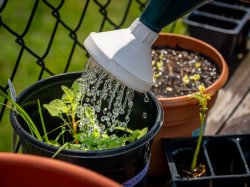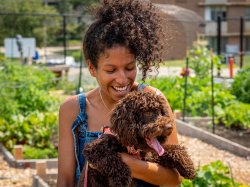An ‘Urban Garden’ Takes Root on Campus
A small patch of fertile ground grows fresh vegetables for the Red Hawk Pantry
Posted in: Homepage News, Science and Technology, Uncategorized, University

The first thing Brittney Portes does in the mornings when she opens the gates to the University’s community garden, is check on the vegetables, and the bunnies. She discovered a nest this summer and despite how they nibble on lettuce, “I don’t have the heart to remove them,” she says.
Luckily there’s plenty to go around. The garden at Montclair State University is flourishing. Zucchinis, corn, carrots and beets. Tomatoes, cucumbers, okra and squash – most of the harvest is donated to the Red Hawk Pantry. “There are so many different fun options in the garden right now,” Portes says.
Portes is the lead gardener of the community plots, a green space tucked behind the Student Center and run by the PSEG Institute for Sustainability Studies (PSEG ISS). A plastic owl stands guard to scare away birds, and sunflowers stand 10 feet tall. It’s a labor of love for about 100 Montclair staff, faculty and students, and over summer break, campers from inner-cities who pitched in planting, tending and harvesting.

“We’re trying to grow as much food as possible as sustainably and organically as possible in the small space that we’re given,” Portes says. “It puts an emphasis on how land doesn’t always have to be a barrier to growing food and having access to food.”
So far this season, 250 pounds of vegetables – about 62% of the crops – have been donated to the Red Hawk Pantry, which provides food and toiletry items for students in need. During growing season, the garden provides a variety of fresh, organic vegetables.
“I want to make sure there is food diversity so students have the options to try new things,” Portes says. “I think the zucchinis, for example, at first students were like, ‘Whoa, what’s that? They’re huge.’ But now people are actually taking the zucchinis in the pantry.”

Portes has a background in organic, permaculture and small-scale farming. As the communication specialist at PSEG ISS, she’s been a podcaster on sustainability issues. But growing up in northern New Jersey, it wasn’t until she was 18 that she actually visited a farm first hand – or even went on a hike.
“Eating my first carrot out of the ground, I thought, this is disgusting,” she recalls. “I remember the farmer telling me, ‘Brittney, that’s what a carrot is supposed to taste like.’ The experience changed my life. I felt connected to something I had never experienced.”
Ronald Ortega, a junior Biology major, assists in the garden. In the mornings, they’ll assess what the bunnies have eaten, and then get to work, weeding, pruning, maybe tackling big projects like repairing raised beds or mulching the paths. “I think as a farmer and even as the garden lead, it’s about being in tune with nature, being in tune with what’s happening,” Portes says.

This fall, students are invited to join a new gardening club. In the spring, applications for beds will open to the campus community. Portes will help as Montclair gardeners get their hands in the soil and start growing.
“It might not change their life immediately,” Portes says. “But I think it’s the starting point that helps turn the wheels in people’s heads to ask, ‘Where is my food coming from? What is my relationship with how food is grown? And how can I change my own relationship with our food systems?’”

Story by Staff Writer Marilyn Joyce Lehren. Photos by University Photographer Mike Peters.
You may also like:
